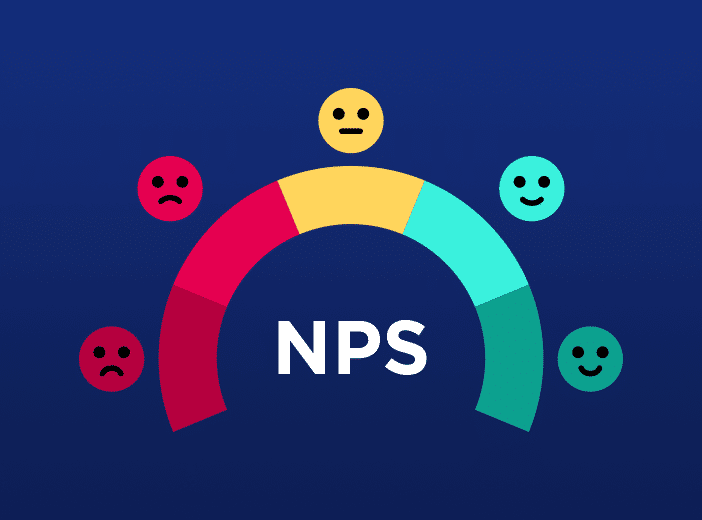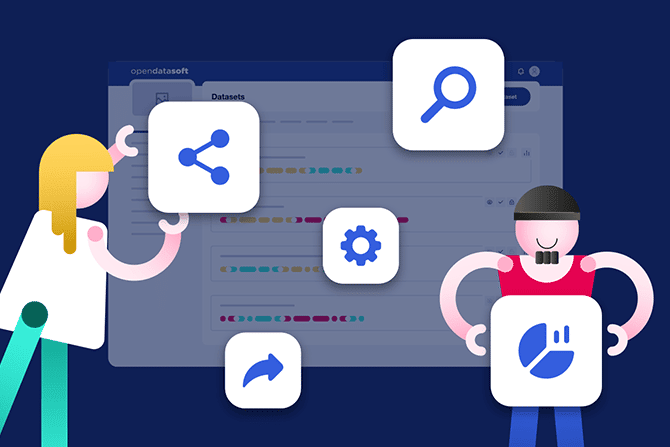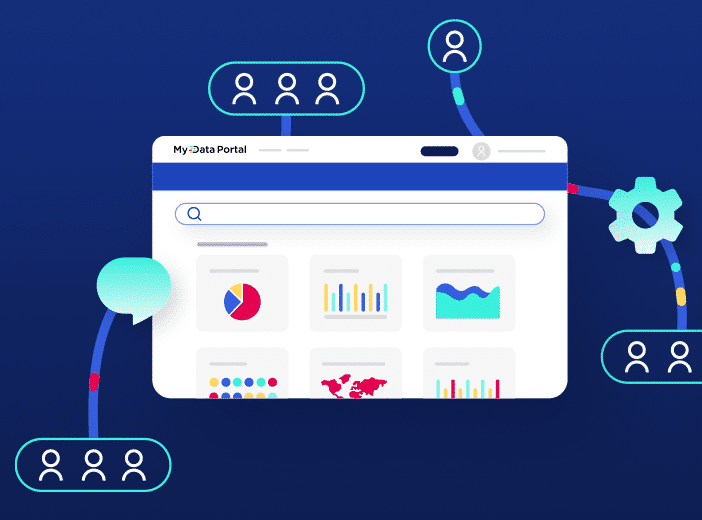Opendatasoft: a solution valued by clients for its features and support

At Opendatasoft we are continually aiming to improve our technology and approach. To better understand our strengths and weaknesses we therefore carry out an annual client satisfaction survey. Learn more in this article!
For twelve years, Opendatasoft teams have worked alongside public and private sector organizations across the globe to help them democratize the consumption of their data as widely as possible. We help customers create value at the scale across their organization and ecosystems through our data portal solution.
At Opendatasoft we are continually aiming to improve our technology and approach. To better understand our strengths and weaknesses we therefore carry out an annual client satisfaction survey. As well as identifying what our customers value most about our solution, this allows us to calculate our Net Promoter Score (NPS).
Support from the Opendatasoft teams
Opendatasoft’s different teams work together to offer a high-performance solution and quality support to our clients as they create and launch their data portals.
The Product and Engineering teams constantly deliver new features and improve existing ones to meet our clients’ expectations around data collection, enrichment and sharing, as well as to ensure optimal security and increased performance.
The Customer Services and Support teams provide technical and account management support to enable our clients to get the most out of our solution. Multiple support options are provided to meet clients’ specific needs throughout the deployment and maintenance of their data projects.
The Marketing and Sales teams are always available to help our clients communicate, identify best practices, and create environments conducive to knowledge sharing and exchange among data leaders.
The results of Opendatasoft’s satisfaction survey and Net Promoter Score
Evaluating the Net Promoter Score allows us to identify the proportion of our clients who would recommend Opendatasoft to their colleagues or peers. It is an internationally recognized indicator for measuring overall satisfaction, based on a ten point scale. It provides figures for the number of clients who are positive promoters of Opendatasoft (rating between 9 and 10), passives (giving a score between 7 and 8), and detractors (below 7). By subtracting detractors from promoters, the overall NPS is calculated.
In 2023, Opendatasoft achieved a NPS of 34.95 , a score we are very proud of. Each year, an increasing number of our clients take the time to respond to our survey and share their feedback.
In addition to the Net Promoter Score, we ask our clients to complete a more in-depth survey to identify the strengths of our solution and areas for improvement. This enables us to improve our product and guide the efforts of all our teams.
Why our clients choose Opendatasoft to create their data portal
A good SaaS solution stands out in multiple key ways: its ease of use, robustness and performance, the variety of its features, and of course, the quality of support from the Customer Services and Support teams. Positively, these are all criteria endorsed by our clients in our satisfaction survey.
The simplicity and ease of use of our solution
Simplicity is one of our core values. And for good reason: our mission is to democratize data management and usage to facilitate access. This is reflected in the approach of our Customer Services Managers (CSMs) and our Support team staff who have developed deep relationships based on trust, supporting our clients to become autonomous on our platform.
Furthermore, simplicity is also a cornerstone of our product vision, as we focus heavily on the ease of use of our solution and its features. Notable aspects include:
- More than 80 connectors allowing easy integration with all of an organization’s data management tools and sources
- Over 50 processors to assist portal administrators in implementing instant, advanced processes (geographic transformations, text correction, date formatting, etc.) without having to write a single line of code
- A no-code studio for creating visualizations and dashboards, as well as a more advanced code editor to meet the needs of all teams
- Easy to use metadata templates based on international standards (including ISO, DCMI, DCAT, and INSPIRE)
- Structured APIs generated for each dataset, backed up by an exploration console and reference documentation that allows organizations to share data on a large scale across different ecosystems, or connect their portals to third-party tools or applications
- A data lineage module enabling at-a-glance analysis of the uses and reuses of data assets on the portal
The user experience of our clients’ data portals is designed to be intuitive, similar to an e-commerce site, requiring no specific skills or training. Our clients can thus ensure:
- Smooth and personalized navigation on their portal, combining their brand identity with the best practices of a successful user experience
- Advanced search capabilities through an intelligent search engine based on AI and automatic suggestions
- Increased data discoverability through a multi-asset catalog, allowing users to find all kinds of data products: datasets, visualizations, dashboards, APIs, etc

For CDOs, CIOs, or data managers, the Opendatasoft data portal solution is a key asset for simplifying access to this valuable resource, data. At the technology level, we provide multiple features that simplify the administration of data portals and enable a smooth, rapid journey for all types of data users, from developers through non-technical business users to data analysts.
The richness and effectiveness of our solution's features
Our goal is to help organizations bridge the gap between supply and demand in terms of data usage by making data available on a large scale by their teams, partners, and citizens. Drawing on our long-standing expertise in data management and sharing allows us to offer unique and relevant features to our clients to meet their specific needs.
Our deep, ambitious product roadmap enables us to continuously deliver new features. We recently introduced product innovations based on AI following a hackathon organized with our Infrastructure, Security, Engineering, and Customer Services teams.
Using AI-based intelligent search, portals designed with Opendatasoft now include a semantic search feature that goes beyond keyword matches to understand the meaning of terms and their context. It also suggests results in real-time, as users type their query. This has improved the ability to find relevant results for each query, saving time and delivering more relevant results.
All the latest product news can be found on our blog:
- API Automation: this automates the back office management of a data portal created with Opendatasoft and optimizes interoperability between the tools within your organization’s technology stack
- Data lineage: this measures how your stakeholders use your data and improves data portal management
- Data collection form: to automate the enrichment and updating of data and save time
- Metadata model: providing the ability create custom metadata models or activate predefined models based on international standards
- New integrations: enabling you to connect your data portal with all your daily tools. The latest integrations include: Collibra, Databricks, Microsoft Azure, and Amazon S3

Democratizing data usage within an organization and across its broader ecosystems requires a solution that is sufficiently flexible and scalable to meet all users’ needs. By listening to feedback from our clients, every day we strive to deliver the most beneficial new features to help them meet their challenges.
The performance of our solution
Opendatasoft is committed to ensuring the reliability of its services through robust technology capable of meeting the needs of large-scale projects. Our teams focus on meeting the needs of our partners and clients, respecting data governance rules and applying strict security standards.
This allows us to guarantee the optimal performance of our solution in all circumstances, as well as ensuring data security and compliance with organizational governance rules:
- Our Kubernetes-based architecture enables us to automate scaling to meet our clients’ needs. We can also reduce deployment times and be more agile in how we develop new features.
- Our multi-cloud solution is designed to allow us to meet our clients’ global requirements through extensive geographical coverage for cloud hosting. Based on their needs, we offer clients the option to deploy their Opendatasoft portal on various platforms, including Amazon Web Services, Outscale, and Oracle Cloud.
- We constantly monitor the security of our solution, with robust and audited application security, secure data isolation, and customized security settings.

Our clients produce, collect, and share increasingly large volumes of data, working with a growing number of internal and external stakeholders. That's why we are investing heavily to strengthen the reliability and robustness of our solution. This is essential to allow our clients to create high impact data experiences.
The quality of our client support
At Opendatasoft, we understand that support and guidance from our teams is essential for organizations to make the most of our solution. Our specialists therefore work closely with clients to help them develop new uses and to help them democratize access to data.
The Customer Services team supports daily project management, and helps to track progress against objectives, provides the necessary resources and advice to enable our clients to learn skills and become independent, promotes projects and acts as an internal champion with our other teams.
In 2023, we launched a new Premium support offering advisory and technical support to help our clients design, plan, and execute large-scale data projects. The Support team, made up of developers, infrastructure and security engineers as well as product managers, maintains daily relationships with our users to answer technical questions and problem-solve.
Our support teams offer a same day response to client requests (within four hours on working days in urgent cases). In 2023 we achieved a 93% satisfaction rate for support requests.

We are focused on the continuous improvement of our services and support and our team has developed a wide variety of skills to meet our clients' needs. We are very proud of the results of this satisfaction survey, which is a reward for our efforts to date and allows us to continue moving in the right direction.
In 2024, we will continue to introduce new innovations to our data portal solution – keep reading our blog to find out more!

Data democratization requires a strong data experience platform that is flexible enough to meet a range of user needs. In this blog we bring together a selection of our customers’ favorite features that help them save time and deliver compelling data experiences.

How can you break down silos and make data available to everyone within your organization, not just data specialists? How do you get employees to use data effectively in their everyday working lives? This article explains the key features you need on your data portal to engage users and maximize data sharing and reuse.

Access to accurate statistical information is key to the successful functioning of the global economy and for policymakers and businesses to make informed decisions around subjects that impact us all. How can institutions effectively and efficiently share their statistical data in an interoperable, scalable way to democratize access and build trust?
